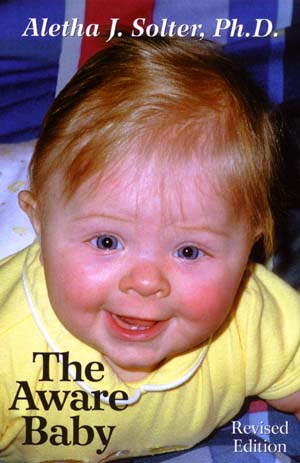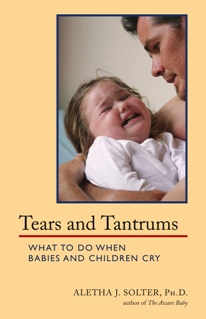Fussy ten-month-old
by Aletha Solter, Ph.D.
Question:
I have a ten-month-old daughter, and she cries almost constantly and for no apparent reason. She constantly wants to be held and cries if I don't pick her up, but at the same time will cry if I do. She has moments when she will play quietly, but as soon as she notices me, her father or grandparents, she scrambles to them or sits there and cries. She laughs when I tell her no and continually gets into things after I've told her a million times not to. It's almost like a game, but it invariably it ends with her crying. I'm a stay-at-home mom and give her my undivided attention, but she makes me feel guilty when I try to cook dinner, clean the house, or pay any attention to her father. Whenever her father and I hug or sit together closely, she cries and hits at us. I can't go to the bathroom or put anything away in another room without hearing her wail and follow me. This has been going on for the last four or five months. I need some help before I lose my mind!! What should I do?
Answer:
There are several developmental aspects of your question that I would like to address. First of all, it is normal for babies to have strong separation anxiety from their primary caretakers during the second half of their first year. They experience a new sense of separateness and vulnerability during this stage, causing them to want to be physically close to their mother (or other familiar caretakers). They strongly resist separations, sometimes refusing to let their mother out of sight, as you have observed with your daughter. Babies this age are unlikely to let strangers hold them or even interact with them. This separation anxiety sometimes begins as early as six months of age, typically peaks around one year of age, and can last for several years. It is generally considered to be a good sign of healthy attachment, although it can be a difficult stage for parents to cope with.
If you go to another room, tell your daughter that you are leaving the room, where you are going, and when you will be back. Then let her follow you if she wishes to do so. This will create more trust and safety for her than if you disappear with no warning. If you want privacy in the bathroom, warn her ahead of time, close the door, but talk to her through the door to reassure her that you are still there.
Secondly, babies this age cannot understand the concept of a rule. When you say "no," she understands what you mean, but she will not comprehend that this "no" still applies the next day or in another situation. She is unable to generalize it and to adapt her behavior accordingly. That is probably why you are both becoming frustrated. The ability to learn and follow household rules does not emerge until 21 to 24 months of age, so you have another year to go. Therefore, the best way to prevent conflicts with your daughter at this stage is to baby proof your home as much as possible. This way, you will not have to say no very much, and you will avoid the frustrations you have described. With the use of baby proof latches, doorknobs, and gates, and by putting all dangerous objects out of reach, you will prevent this problem to some extent by reducing the number of situations in which you must say no.
If you must say no, try to figure out what your daughter's underlying need is, and look for acceptable ways to meet the need. The need may be a skill that she is trying to practice. For example, if she repeatedly dumps out the contents of a wastebasket, perhaps she is trying to understand the physical concept of gravity, and the spatial concepts of empty versus full and inside versus outside. You could provide her with a small wastebasket that she can fill with toys and empty as she wishes. Then, when she starts to dump the real one, you can show her the toy one and encourage her to play with it instead. By redirecting your daughter's behavior (rather than just saying "no"), you will help to reduce her frustrations and her "testing" behavior.
Another possibility to consider is that your daughter is bored. Babies this age needs lots of stimulation and different kinds of toys. It is unrealistic to expect them to play contentedly with the same old toys day after day. Babies also need to be held and cuddled frequently, and they need to interact with other people. You will not spoil her if you hold her or play with her when she seems to want this.
Finally, at the very beginning of your question, you mention that your daughter cries almost constantly and for no reason. When a baby continues to cry after all immediate needs have been met, even though she is being held, it is possible that the crying is serving an important stress-release function. This function of crying is not widely recognized, but it is very important. Her continued crying does not mean that you are inadequate, nor does it imply that she is misbehaving. She may simply be trying to release accumulated tensions and stress, just as you yourself might cry in the arms of your husband after a stressful day. Crying is normal and healthy, and babies have a lot to cry about because their lives are never completely free of stress, even with the best of parenting. One of the roles of parents is to listen and empathize with children. You cannot always "fix" everything for your daughter, but you can help by being there, holding her, listening, and letting her know that you love her. So my advice is to let your daughter cry in your arms as long as she needs to (after all immediate needs have been met). After she "catches up" on the crying she needs to do, she will probably become much less demanding and fussy.
About Aletha Solter:
Aletha Solter, PhD, is a developmental psychologist, international speaker, consultant, and founder of the Aware Parenting Institute. Her books have been translated into many languages, and she is recognized internationally as an expert on attachment, trauma, and non-punitive discipline.
Aware Parenting is a philosophy of child-rearing that has the potential to change the world. Based on cutting-edge research and insights in child development, Aware Parenting questions most traditional assumptions about raising children, and proposes a new approach that can profoundly shift a parent's relationship with his or her child. Parents who follow this approach raise children who are bright, compassionate, competent, nonviolent, and drug free.
For more information about babies and crying, see Aletha Solter's books, The Aware Baby, and Tears and Tantrums.

